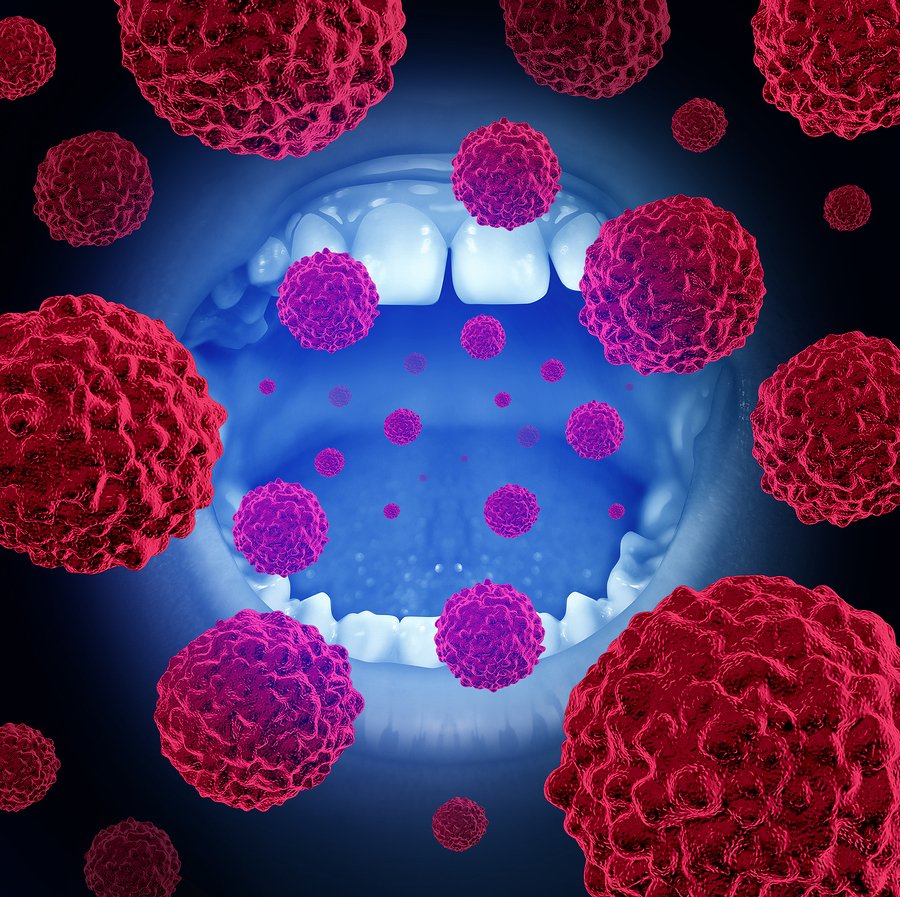According to The American Cancer Society, over 50,000 people develop some form of oral cancer each year. Oral cancer can be cured in approximately 80% of patients as long as it is detected early. To keep your mouth healthy, learn how to identify oral cancer in its early stages and take the following proactive steps to reduce your risk.
How Do You Get Oral Cancer?
Oral cancer occurs when cells within the mouth develop mutations in their DNA. These changes allow cancer cells to continue to divide and grow when healthy cells would normally die. As cancer cells accumulate, they cause damage to surrounding tissue and can spread to other parts of the body.
Oral Cancer Risk Factors
It’s not always clear why mutations occur; however, experts have identified certain risk factors for oral cancer, including:
- Heavy alcohol consumption
- Weakened immune system
- Excessive sun exposure to the lips
- Contracting the human papillomavirus (HPV)
- Tobacco use of any kind, including cigars, cigarettes, chewing tobacco, pipes and snuff
Mouth Cancer Prevention Tips
According to the American Cancer Society, men face twice the risk of developing oral cancer as women, with men over the age of 50 facing the greatest risk. Sometimes, oral cancer can develop without any known cause. This is why it is important to eat a healthy diet and avoid known oral cancer risk factors. It’s also important to visit your dentist for routine cancer screenings and familiarize yourself with the potential signs and symptoms of oral cancer.
Oral Cancer Symptoms
When examining the mouth for oral cancer symptoms, dentists typically look for the following:
- Bleeding sores
- Sores that do not heal
- Poorly fitting dentures
- Loose teeth
- Lumps, growth or thickening of the lining of the mouth
- Tongue pain
- Stiffness or pain in the jaw
- Pain when chewing or swallowing
- Unexplained sores, irritation, or thickness in your mouth or throat
Sometimes, it’s not easy to determine whether a sore or lesion is cancerous. If your dentist finds something irregular, he or she may recommend a biopsy to check for cancer cells.
How to Prevent Throat Cancer
The prevention of oral cancer depends on avoiding activities that increase your risk. It also helps to embrace lifestyle factors that reduce your chances of developing a range of health issues including cancer.
- Do not use tobacco of any kind.
- Avoid second-hand cigarette smoke if possible.
- Drink alcohol in moderation or avoid it entirely.
- Use UV-blocking lip balm on your lips.
- Exercise regularly.
- Maintain a healthy weight.
- Wear condoms and dental dams to prevent the transmission of HPV.
- Regularly inspect your mouth and lips for abnormalities.
- Make sure your dentures fit well.
- Visit the dentist regularly to allow for early identification and treatment of possible areas of concern.
According to research, you can also drastically reduce your risk of developing oral cancer by eating several servings of fruits and vegetables every day. The vitamins and antioxidants in fruits and vegetables can boost your immune system and protect your mouth. There is also some evidence that green tea could help prevent and slow the growth of oral cancer.
How to Stop Oral Cancer
Even if you know how to avoid oral cancer, you still need to get screened to catch potential problems while they are more easily treatable. Since anyone can develop oral cancer, it’s best to see your dentist regularly to check for potential problems. Remember, oral health is about more than good oral hygiene and proper dental care.
As part of a routine dental examination, your dentist will usually inspect your entire mouth for suspicious sores or abnormal areas that may indicate oral cancer or precancerous changes. When caught early, oral cancer is very treatable. If left untreated, however, this type of cancer can lead to serious complications, including reconstructive facial surgery and death. To lower your risk, make an appointment with your doctor or dentist for a routine oral cancer screening. Remember, treatment is more effective when the disease is detected, diagnosed, and treated early.
Gentle Dental is here to take care of every smile. Find a Gentle Dental location near you.
This information has been reviewed by the Gentle Dental Clinical review committee.


 Previous Article
Previous Article

